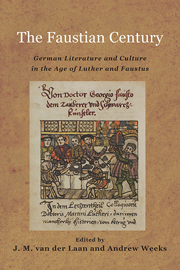Book contents
- Frontmatter
- Contents
- List of Illustrations
- Acknowledgments
- Introduction: Faust Scholarship and the Project at Hand
- 1 The German Faustian Century
- 2 Faustus of the Sixteenth Century: His Life, Legend, and Myth
- 3 Cornelius Agrippa's Double Presence in the Faustian Century
- 4 Converging Magical Legends: Faustus, Paracelsus, and Trithemius
- 5 Faust from Cipher to Sign and Pious to Profane
- 6 The Aesthetics of the 1587 Spies Historia von D. Johann Fausten
- 7 The Lutheran Faust: Repentance in the Augsburg Confession and the German Faustbuch
- 8 Marriage in the Historia von D. Johann Fausten (1587)
- 9 Antiauthoritarianism and the Problem of Knowledge in the Faustbuch
- 10 Exploring the “Three-Fold World”: Faust as Alchemist, Astrologer, and Magician
- 11 The Devil in the Early Modern World and in Sixteenth-Century German Devil Literature
- 12 Encounters with “Schwarz-Hans”: Jacob Böhme and the Literature of the Devil in the Sixteenth Century
- 13 D. Johann Faust and the Cannibals: Geographic Horizons in the Sixteenth Century
- A Sixteenth-Century Chronology of Significant References to Faust with Parallel World Events
- Select Bibliography
- Notes on the Contributors
- Index
1 - The German Faustian Century
Published online by Cambridge University Press: 05 May 2013
- Frontmatter
- Contents
- List of Illustrations
- Acknowledgments
- Introduction: Faust Scholarship and the Project at Hand
- 1 The German Faustian Century
- 2 Faustus of the Sixteenth Century: His Life, Legend, and Myth
- 3 Cornelius Agrippa's Double Presence in the Faustian Century
- 4 Converging Magical Legends: Faustus, Paracelsus, and Trithemius
- 5 Faust from Cipher to Sign and Pious to Profane
- 6 The Aesthetics of the 1587 Spies Historia von D. Johann Fausten
- 7 The Lutheran Faust: Repentance in the Augsburg Confession and the German Faustbuch
- 8 Marriage in the Historia von D. Johann Fausten (1587)
- 9 Antiauthoritarianism and the Problem of Knowledge in the Faustbuch
- 10 Exploring the “Three-Fold World”: Faust as Alchemist, Astrologer, and Magician
- 11 The Devil in the Early Modern World and in Sixteenth-Century German Devil Literature
- 12 Encounters with “Schwarz-Hans”: Jacob Böhme and the Literature of the Devil in the Sixteenth Century
- 13 D. Johann Faust and the Cannibals: Geographic Horizons in the Sixteenth Century
- A Sixteenth-Century Chronology of Significant References to Faust with Parallel World Events
- Select Bibliography
- Notes on the Contributors
- Index
Summary
The sixteenth-century Faust phenomenon is a monument without an inscription. Few doubt the historical importance of the anonymous 1587 Historia von D. Johann Fausten, but how the story relates to the time of its origins is not self-evident. Does Faustus signify the rebellion of the new sciences against religious authority or the rejection of Renaissance humanism, the obscurantism of the Reformation or the latent nihilism of the dawning modern age?
As noted in the introduction, this volume aims to illuminate the Faust phenomenon by focusing on what the work shares with its age: the obsession with the devil and curiosity about magic, Lutheranism, and the ambiguous relations between religious and worldly authority. The editors hope these excursions into the age of Dr. Faustus will provide partial reconnaissance of an era that has often been misunderstood, ignored, or forgotten by scholars: the age of the late Reformation and more generally the culture of the German sixteenth century, considered from the vantage of its culmination. Few aspects of the Reformation Century are more relevant to our time than the polarization reflected in the inner conflict and concluding damnation of the Faustbuch. Since its background is obscure, the objective here is to examine the book together with its time and in harmony with recent advances in historical studies.
Recent sixteenth-century scholarship recognizes a “long reformation,” centuries in duration and European in scope. However, historians of the early Wittenberg Reformation, schooled in the heroic narrative of a transformation from below by the “lowly monk Luther” and his adherents or oriented toward narratives of radicals, plebeians, and outsiders to the ranks of the magisterial Reformation, have had difficulty assimilating the ambivalence of developments that unfolded in the decades after Luther's death and the Lutheran defeat of 1547.
- Type
- Chapter
- Information
- The Faustian CenturyGerman Literature and Culture in the Age of Luther and Faustus, pp. 17 - 42Publisher: Boydell & BrewerPrint publication year: 2013



